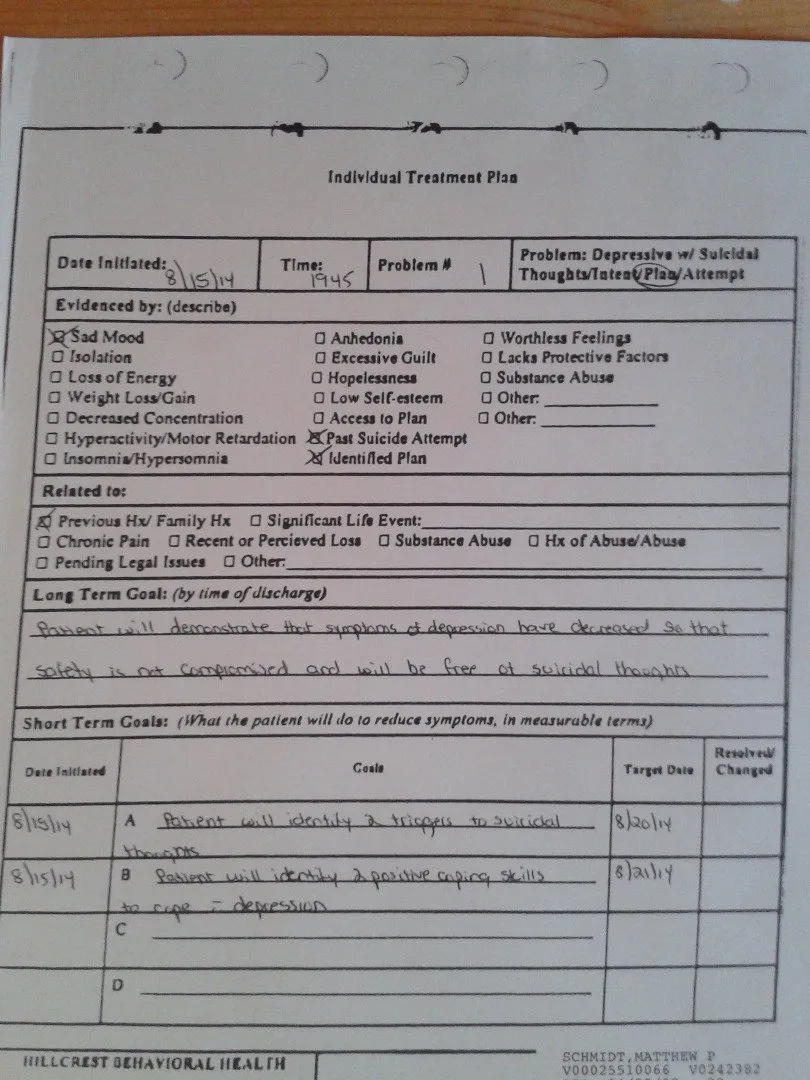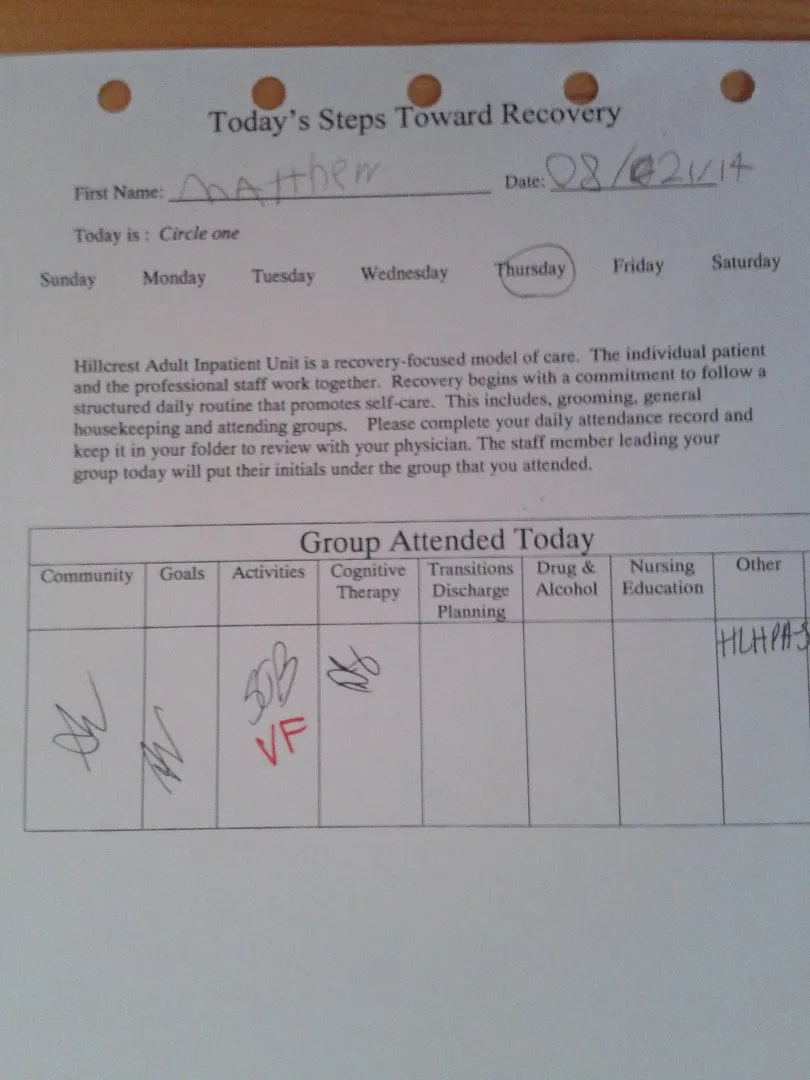I have never seen a psych ward depicted accurately in fiction.
I have the experience to say so, because a few years ago, after a suicide attempt, I signed myself into a psych ward. About a year later, when I realized my thinking had become similarly irrational, I did the same. Both visits helped--and were nothing like in fiction.

But what do you picture it was like?
Locked doors, drooling madmen in hospital gowns, distant screams from forced ECT, and restraints, needles, and inhumanity?
How about quiet hallways, TVs, books, where people wander around in their own clothing, sit at tables and talk to each other or staff, and occasionally hang in their rooms to relax?
In fact, if this sounds like your standard hospital floor, except that every patient is literally insane... you'd be correct.
The two times I "visited" were significantly different--by my second visit, they had rearranged the floors and had become significantly stricter. Even while I stayed the second time, they starting enforcing a line for meals, for the quite understandable reason that the meal guy does not want to be mobbed by a literal crazed mob.
The ward I stayed was a temporary stabilization facility, not a long-term residential unit. My first visit was slightly over a week, the second a few days shorter. The longest I'd ever seen while inside was a man who was there for four weeks, a schizophrenic who heard demons and was undergoing ECT. (I can remember his haunted face to this day.)
Similarly, there were actually two wards, adjacent but locked off from each other. The second, officially called Rapid, but which I personally called the Double Crazy Ward, were for patients too unstable or, well, insane, for the "normal" to tolerate. I actually saw the inside a few times as I passed through--it was very quiet, being that if you're staying, you're also probably doped up on tranquilizers.
But what all was there?
"This place is great! It's like County [Jail], except the people are nicer and you get to keep your clothes." -- One lady's review.
“We know not whether laws be right / Or whether laws be wrong / All we know who lie in gaol / Is that the walls are strong / And each day is like a year / A year whose days are long.” --Oscar Wilde, The Ballad of Reading Gaol.
The psych ward is a place to get well, not a vacation. While we were well stocked with soft-cover books, TVs, exercise equipment, puzzles, boardgames, sometimes snacks, and coloring pages. BEFORE IT WAS COOL!

But anything that isn't there, and that you didn't or weren't allowed to bring... nope.
There is no Internet. (The horror.) There is also no cellphones. (THE HORROR.) The ways to call outside are limited. (The... OK, that wasn't that bad.)
But this had a very good benefit: sanity. You'd be amazed at how much stress teh internetz adds to one's life. I'm amazed at how negative people get on the Internet (including, admittedly, myself) It's terrible for one's mental health.
For those whose home life was filled with stress, it was even better to be separated from it. Unfortunately, this didn't stop it from spilling back in, to everyone's misery.
Visits were allowed, but only at a few times a week. Otherwise, people just talked on the phone a lot. Other than that... you wait. And wait. For, hopefully...
To avoid everyone becoming totally bored, and also, y'know, to teach basic coping skills, most weekdays were filled with activities--called groups. Attendance was not technically mandatory, but there's literally nothing else to do, and they shut off the phones. The times I had no group to attend (some were specifically for drug addicts), I had to cope with doing little for a whole hour.
What were these activities? Yoga, board games, counseling, art, and just plain coping skills teaching. Usually the therapist began by asking each attendee how they are feeling, then a simple related question ("What is one time you felt like you messed up, and wanted to go back?") and so on. Then the activity, which tried to include everyone, then more or less the same thing at the end. Then, each person got a daily paper signed to show they really attended. (See below for why.)

I'll give an example of how much this meant. I enjoy board games. I've played High Frontier, I understand Magic Realm, I've even read Magic's enormous complete rulebook for fun. (Yes, I'm a Melvin). LCR is a game I would not have bothered to sneeze on, being both trivial and completely without choice. Once, that was the game we played in games class... and despite myself, it was one of the most fun times I've ever had playing a game.

If this all sounds like some adult form of Sunday School... you're basically right.
[In line for medicine] "This conversation is so wrong." -- Me
"Look where you are!" gestures "You're in the nuthouse!" -- A friend.
Medicine was technically optional.
No, I'm serious. You could refuse to take medicine if you want, or get your blood pressure taken, or speak to your doctor, or do just about anything. I never saw anyone have a pill forced down their throat, but they did reserve the right to use tranquilizers and restraints.
But people there really did want to get better, and the ways to do so was to take your medicine. Further, if you took a pill, they made you open your mouth to show you really did swallow it.
After all, there was a second reason to cooperate...
Did you think you could escape just by being a lunatic? Nope.
Each day one filled out at least two short questionnaires. Both contained the usual questions to ask, such as "Are you hearing or seeing things other people are not?" or "Are you in pain?" or "Are you planning to hurt yourself or others?". The first, in the morning, was supposed to establish your day's goal, while the second said whether you thought you accomplished it. Theoretically, these were to correspond with your treatment goals (see the top image).
And those treatment goals were your key to getting out. You do not get out when you somehow convince your doctor you are sane (this bugged me in one short story I read.) No, you get out after following your treatment plan, which included, mainly, getting your paperwork done.
This wasn't a bad thing, mind you! This forced everyone to actually show they were attending groups, taking their medicine, at least giving an effort to improve.
"There's nothing to do in here but gossip and eat!" -- Another lady's review.
"You have to ask, are you sure you want your kids to come here. This is a locked psychiatric facility. Anything could happen. A patient could flip out, staff could flip out..." -- A no-nonsense nursing tech.
There are incredibly sad stories there. I'm not repeating them, first because you wouldn't believe how effed up life can get, and second because people deserve their privacy. People were not reticent in sharing their sorrows with anyone who would listen--patient and staff alike. (The latter were available to talk literally 24/7, since the nurses' station was always manned. If you had a bad nightmare, I'm sure they'd talk to you.)
But then there were the other complaints:
You would not believe the amount of angst this kind of thing caused. Perhaps there is a certain human need for drama, which seeks the nearest offensive thing. Or maybe, when all the edges are sawed off and people have nothing to do, then even trivialities get to you.
I am not immune. There were things that slowly got to me, such as the inaccurate schedules, or when people complained about not following treatment goals that didn't exist yet. D:<
Meanwhile...
Inevitably, there's the people who are a little too crazy, but perhaps not crazy enough for the Double Crazy Ward. You know how in a group there's always THAT GUY? The guy who needs only a demonstrative followed by a noun to be identified? Now realize he's now officially crazy, in a locked facility with you. And there's no way out.
Not everyone's bad--and really, it's better not to consider someone "bad" simply because they are intolerable.
You do meet people in there, and there's little need to break the ice, since everyone's been there, wherever "there" happens to be. The staff always encourages it--after all, the point is to get healthy, and friendships are a great way to do that.
But that said, I don't know if it'd be healthy to continue said friendships outside, and theoretically you're not supposed to mention outside that you knew someone. I personally didn't meet up after leaving. (If any of the Cool Kids Club are reading this--I'm sorry I didn't follow up after I left.)
There's way too much little things to describe which add to the experience. The number of nurses, nursing techs, and doctors who you end up talking to. The little injokes, the personalities, even the variety of disorders. The number of things they did or didn't do, because someone had flipped out with pencils, or the bedroom drawers. (Yes.)
"I hope my new roommate isn't a psycho." -- A lady.
If you've been considering suicide, or considering something else that would lead to you to consider hospitalization, don't think of it as scary. It probably won't be what you expect--and probably for the better. I can't guarantee that it will be pleasant (though it could be fun), but it's certainly better than suicide.
And for many, it was not only a life-saver, but a life-changer. They walk in with a ruined life, and walk out, not necessarily with a fixed one, but with hope.